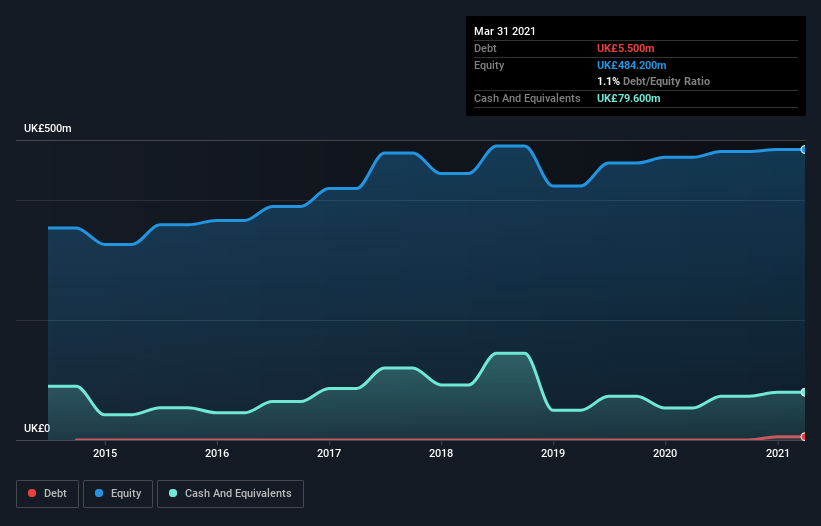The external fund manager backed by Berkshire Hathaway's Charlie Munger, Li Lu, makes no bones about it when he says 'The biggest investment risk is not the volatility of prices, but whether you will suffer a permanent loss of capital.' It's only natural to consider a company's balance sheet when you examine how risky it is, since debt is often involved when a business collapses. We can see that Victrex plc (LON:VCT) does use debt in its business. But should shareholders be worried about its use of debt?
Why Does Debt Bring Risk?
Generally speaking, debt only becomes a real problem when a company can't easily pay it off, either by raising capital or with its own cash flow. Ultimately, if the company can't fulfill its legal obligations to repay debt, shareholders could walk away with nothing. While that is not too common, we often do see indebted companies permanently diluting shareholders because lenders force them to raise capital at a distressed price. Of course, debt can be an important tool in businesses, particularly capital heavy businesses. The first step when considering a company's debt levels is to consider its cash and debt together.
View our latest analysis for Victrex
What Is Victrex's Debt?
The image below, which you can click on for greater detail, shows that at March 2021 Victrex had debt of UK£5.50m, up from none in one year. But it also has UK£79.6m in cash to offset that, meaning it has UK£74.1m net cash.

How Strong Is Victrex's Balance Sheet?
According to the last reported balance sheet, Victrex had liabilities of UK£39.5m due within 12 months, and liabilities of UK£34.9m due beyond 12 months. Offsetting these obligations, it had cash of UK£79.6m as well as receivables valued at UK£45.6m due within 12 months. So it can boast UK£50.8m more liquid assets than total liabilities.
This surplus suggests that Victrex has a conservative balance sheet, and could probably eliminate its debt without much difficulty. Succinctly put, Victrex boasts net cash, so it's fair to say it does not have a heavy debt load!
It is just as well that Victrex's load is not too heavy, because its EBIT was down 36% over the last year. When it comes to paying off debt, falling earnings are no more useful than sugary sodas are for your health. When analysing debt levels, the balance sheet is the obvious place to start. But ultimately the future profitability of the business will decide if Victrex can strengthen its balance sheet over time. So if you're focused on the future you can check out this free report showing analyst profit forecasts.
But our final consideration is also important, because a company cannot pay debt with paper profits; it needs cold hard cash. While Victrex has net cash on its balance sheet, it's still worth taking a look at its ability to convert earnings before interest and tax (EBIT) to free cash flow, to help us understand how quickly it is building (or eroding) that cash balance. During the last three years, Victrex produced sturdy free cash flow equating to 67% of its EBIT, about what we'd expect. This cold hard cash means it can reduce its debt when it wants to.
Summing up
While it is always sensible to investigate a company's debt, in this case Victrex has UK£74.1m in net cash and a decent-looking balance sheet. And it impressed us with free cash flow of UK£60m, being 67% of its EBIT. So we are not troubled with Victrex's debt use. When analysing debt levels, the balance sheet is the obvious place to start. However, not all investment risk resides within the balance sheet - far from it. Case in point: We've spotted 1 warning sign for Victrex you should be aware of.
At the end of the day, it's often better to focus on companies that are free from net debt. You can access our special list of such companies (all with a track record of profit growth). It's free.
When trading Victrex or any other investment, use the platform considered by many to be the Professional's Gateway to the Worlds Market, Interactive Brokers. You get the lowest-cost* trading on stocks, options, futures, forex, bonds and funds worldwide from a single integrated account. Promoted
New: Manage All Your Stock Portfolios in One Place
We've created the ultimate portfolio companion for stock investors, and it's free.
• Connect an unlimited number of Portfolios and see your total in one currency
• Be alerted to new Warning Signs or Risks via email or mobile
• Track the Fair Value of your stocks
This article by Simply Wall St is general in nature. It does not constitute a recommendation to buy or sell any stock, and does not take account of your objectives, or your financial situation. We aim to bring you long-term focused analysis driven by fundamental data. Note that our analysis may not factor in the latest price-sensitive company announcements or qualitative material. Simply Wall St has no position in any stocks mentioned.
*Interactive Brokers Rated Lowest Cost Broker by StockBrokers.com Annual Online Review 2020
Have feedback on this article? Concerned about the content? Get in touch with us directly. Alternatively, email editorial-team (at) simplywallst.com.
About LSE:VCT
Victrex
Through its subsidiaries, engages in the manufacture and sale of polymer solutions worldwide.
Very undervalued with excellent balance sheet and pays a dividend.
Similar Companies
Market Insights
Community Narratives



